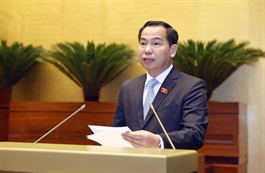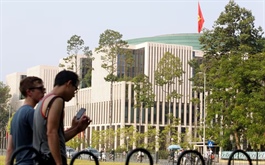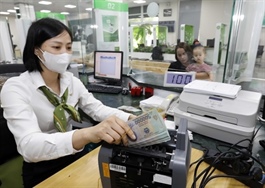Lenders integrate a greener perspective
Lenders integrate a greener perspective
Some major Vietnamese banks are intensifying their focus on sustainable practices by dedicating significant funds to renewable energy projects and reducing interest rates for eco-friendly initiatives.

Tran Hoai Nam, deputy CEO of HDBank, highlighted two main challenges in green development for Vietnam at a net-zero workshop in Hanoi last week.
The first is capital sourcing. As of July, Vietnam’s green credit debt remained modest at about $22.3 billion, accounting for only about 4.2 per cent of the total economic debt.
“The current international financial capital for green development is no longer cheap. In fact, domestic rates are now lower than international ones, with high interest rates in the US and Europe,” Nam noted.
The second challenge is the capacity for innovation in green development, encompassing infrastructure, workforce training, and governance standards. “Not all businesses are ready for this transition, especially concerning investment capital and operational activities,” Nam added.
However, Vietnam has access to preferential capital sources, with major global financial institutions and Vietnamese commercial banks committed to increasing green credit funding. The green transition helps reduce future costs, address environmental issues, and boost sustainable development, Nam said.
“Banks are required to establish environmental and social risk management in credit activities, with a target to increase green credit in the economy to 10 per cent by the end of 2025, up from the current 4.2 per cent. This is a challenging target, but I believe we can achieve it,” Nam explained.
Meanwhile, Dinh Ngoc Dung, deputy director of Corporate Banking at SHB, said, “In our journey towards sustainable banking, 10 per cent of our lending is now directed towards renewable energy sectors, such as wind and solar power.”
This pivot is part of SHB’s broader objective to support 11 key sectors under its green credit umbrella.
Amidst a regulatory framework still in flux, SHB has not shied away from establishing its own green credit criteria.
“We have been proactive in creating our standards for green credit, guided by both international collaboration and local regulations,” Dung explained.
The bank has also launched incentive packages that offer 1-1.5 per cent lower interest rates for green projects. This effort is bolstered by a substantial $253 million fund, earmarked for 2023-2024, to aid businesses in their transition towards sustainable practices.
“Our early adoption of a green banking ethos has set the stage for fruitful partnerships with international entities, aiding in the deployment of effective green project criteria,” Dung said. “Moreover, 37 per cent of our outstanding loans are in the agricultural and rural sector, underscoring our focus on sustainable practices in these critical areas.”
For the 2022-2027 period, SHB’s ambitious plan encompasses financing projects across 11 green sectors. This strategic direction is not just about compliance, but a conscious effort to enhance business efficiency and societal welfare through sustainable finance.
Meanwhile, Lam Thuy Nga, national director of Large Corporate Banking at HSBC Vietnam, emphasised the global bank’s ambition in green development.
“So far, HSBC has secured $2 billion for the Vietnamese green market development. Beyond direct capital arrangement, we also assist clients such as Vingroup in the green transition, helping them upgrade technology and establish policy frameworks.”
Nam of HDBank revealed that it has allocated substantial resources to renewable energy projects. The bank’s investment includes approximately $337.6 million in solar farms, about $257.4 million in rooftop solar initiatives, and around $31.6 million for wind power projects, totalling support for 625 renewable energy projects.
“We have integrated environmental, social, and governance (ESG) practices into our core operations. Our commitment to a green transition is exemplified in its collaborations with international bodies such as the International Finance Corporation, Proparco, and the Asian Development Bank, aimed at bolstering our green credit portfolio,” he added.
Meanwhile, Asia Commercial Bank (ACB) has distinguished itself as the first bank in Vietnam to publish a standalone report on sustainable development.
Tang Hoang Quoc Thai, head of Communications and Brand at ACB said, “In October, we released our first report on sustainable development. The social and governance aspects of ESG have been integral to ACB since its inception. In recent years, we have intensified our focus on the environmental element, altering the entire staff’s perception towards environmental protection.”
ACB has undertaken various programmes to manage and mitigate its environmental impact, notably in reducing loans to businesses adversely affecting the environment.
Elsewhere, Pham Nhu Anh, CEO of MB, revealed that 90 per cent of its funding is currently directed towards renewable and clean energy projects, a move signalling a significant strategic pivot for the bank.
“We are not merely financing a sector; our investment is a commitment to the future of our planet,” Anh said. “As of September 30, our green loan portfolio had reached $2.32 billion, serving nearly 3,800 clients. This accounts for 11 per cent of the bank’s total loan portfolio, with the non-performing loan rate within this segment standing at just 0.8 per cent, significantly lower than the general safe threshold of 3 per cent.”


























